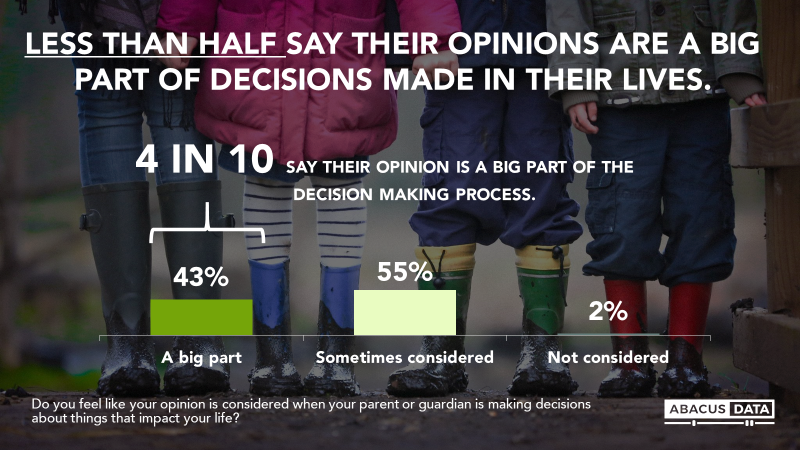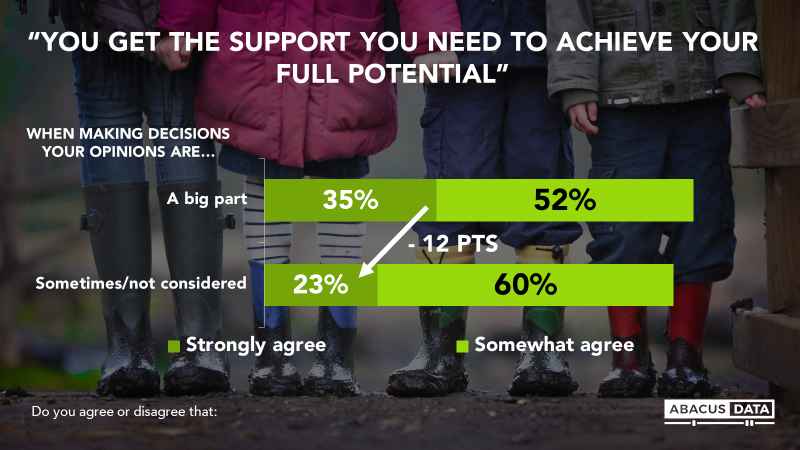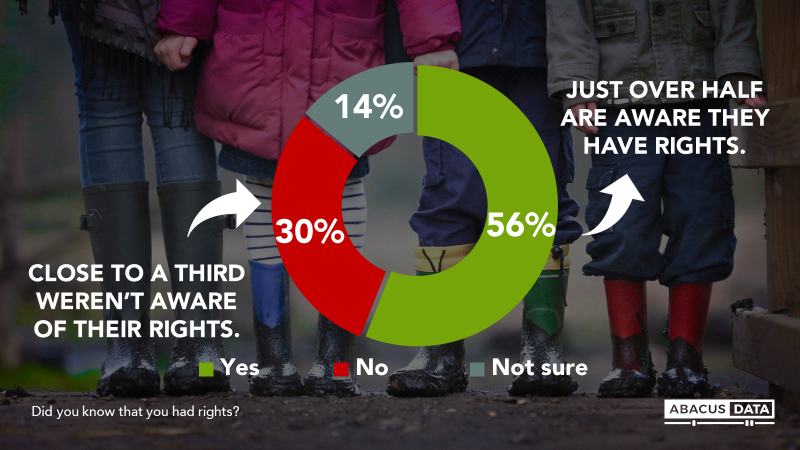National Child Day is an important opportunity to take stock of how kids are faring in Canada. And while there is a lot of hope and opportunity, there are areas where Canada can clearly do better.
The discussion below offers a perspective on the survey of 750 Canadian children aged 12 to 17 for Children First Canada that addressed how Canadians are feeling, their involvement in decisions that affect them, and their perspective on the problems facing and priorities for Canada.
Many kids don’t rate their quality of life positively. A majority may think they have a great quality of life but three in 10 kids aged 12 to 17 say that their quality of life is not very good or great right now. While kids are hopeful, a large percentage of Canadian kids growing up feeling like their quality of life is poor represents a significant challenge for Canada.
There is also the broader question of how kids participate in decisions and ultimately the public sphere. While there are notable kids who have made a big impact on the public stage like Greta Thunberg, not all kids have a voice. Many, however, think they should have one.
Just under half of children feel like they are fully involved in decisions that impact their lives.
We asked children whether or not they feel like their opinion is considered when their parent/guardian is making decisions about things that impact their lives. Less than half say their opinions are a big part of this process. While few kids have their opinions out right ignored, involving children in the decision-making process is clearly empowering and the survey findings show a virtuous circle.
Kids who have their opinions valued and taken into consideration are more hopeful and, importantly, more likely to want to be heard.

One way to think of this is to look at whether kids feel they have the support they need to reach their full potential. Those who feel like they have a large role in the decision-making process on things that affect them are more likely to say they receive the support they need to achieve their full potential. In other words, involving kids in decisions in a way that values their opinion is associated with giving kids confidence that they will be successful and are supported. Not doing so has the opposite effect.

Surprisingly kids lack awareness of their rights. Since the Charter of Rights in 1982, rights have become part of the culture of Canada. And, in 1991 Canada ratified the UN Convention on the Rights of the Child. Despite this, only 56% of kids are aware that they have rights. Even fewer know what to do if they feel their rights have been violated. A lack of understanding of rights is, of course, disempowering.
A lack of awareness of rights is a surprising finding. But it is striking that those who feel their opinions are taken seriously on decisions that affect them are more likely to be aware they have rights. While we cannot say how these things tie together definitely, it is interesting that those who feel they are listened to are also the ones who know their rights. That is, they know they have a voice.

On the whole, most Canadian children feel supported to achieve their full potential, but there is more to do. In fact, a significant number of kids feel they do not have a positive quality of life. A situation that would likely improve if kids are aware of their rights and empowered to be involved in decision-making.
In fact, many kids do not feel that they are participating in the big decisions that affect their lives as much as they could. In addition, the relatively low level of awareness around rights leaves many kids vulnerable in the sense that they do not know what rights they have or what to do if they feel their rights are violated.
Methodology
The survey was conducted with 750 children aged 12 to 17 from October 20 to 27, 2020. Kids were recruited through their parents who received the original invitation and were asked to have their child complete the survey. A random sample of panellists were invited to complete the survey from a set of partner panels based on the Lucid exchange platform. These partners are typically double opt-in survey panels, blended to manage out potential skews in the data from a single source.
The margin of error for a comparable probability-based random sample of the same size is +/- 3.57%, 19 times out of 20.
The data were weighted according to census data to ensure that the sample matched Canada’s population of children according to age, gender and region. Totals may not add up to 100 due to rounding.

